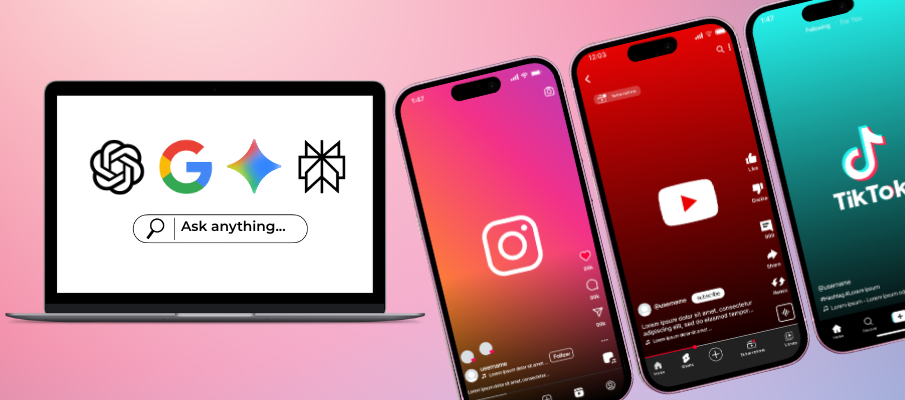Google's Third-Party Cookies Are Here To Stay
By Jaimee Beck on

In June 2021 Google announced that it would be phasing out third-party cookies by the second half of 2024, a move that left some of the digital marketing world braced for change, and others doubting the phase-out would ever happen. Just two years later, the tech giant reversed its decision in July 2024, after postponing their plan to phase out third-party cookies twice.
This change of plan has significant implications for marketers worldwide, particularly in sectors like tourism where targeted advertising and personalisation is crucial.
In this article, we'll look at the reasons behind Google's change of heart and explore what keeping cookies means for the future of digital marketing. We'll discuss the role of third-party cookies, the challenges of finding suitable alternatives, and how we can navigate future changes.
What Are Third Party Cookies?
Think of cookies as tiny digital breadcrumbs that websites leave on your device. When you visit a web page, it might drop a cookie on your computer, tablet, or phone. This cookie remembers your preferences, helps you stay logged in, and tracks your browsing behaviour. They can help provide a smooth user experience as you surf the web.
Third-party cookies are a specific type of cookie that are dropped by a website other than the one you're currently visiting. For example, if you're reading an article on a news website and there's an ad from a travel company, that travel company might drop a third-party cookie on your device.
These cookies are often used for targeted advertising and remarketing. Third party cookie data helps advertisers track your interests and show you ads that are relevant to your browsing history.
Is Google Still Deprecating Third-Party Cookies in 2024?
Are cookies going away in 2024? The short answer is no.
For a while, it looked like third-party cookies were destined for removal. Google, one of the biggest players in the digital advertising world, announced in 2021 that it would phase them out by the second half of 2024 – a move which would have significantly changed the way online advertising works.
However, after several delays in the cookie phase-out plan, Google has decided to keep third-party cookies after all. So, what happened?
Why is Google Keeping Cookies?
Privacy, Technology, and Cookie Concerns
So why did Google change its mind about phasing out cookies? Google's decision to maintain third-party cookies was largely influenced by privacy and technology.
One primary factor was the ongoing development of privacy regulations and the increasing emphasis on data protection. Many privacy advocates argue that cookies allow for excessive tracking of our online behaviour, which can lead to invasive or discriminatory targeted advertising, and concerns around the collection and storage of personal data.
We all know how important it is to protect our personal data, and Google was trying to find ways to do this while still letting advertisers target us with relevant ads. But as it turns out, finding a balance between strict privacy standards and advertiser needs is a tough nut to crack.
Google realised that its replacement technology, the Privacy Sandbox, isn't quite ready to take over from third-party cookies. The Privacy Sandbox initiative aims to reduce cross-site and cross-app tracking while maintaining free access to online content and services. Key features of the initiative, including Federated Learning of Cohorts (FLoC), have been halted by obstacles, while others such as Topics API are still in development.
Development of the Privacy Sandbox will continue despite Google’s decision to keep third-party cookies, with Anthony Chavez, VP of the Privacy Sandbox initiative, saying: “Instead of deprecating third-party cookies, we would introduce a new experience in Chrome that lets people make an informed choice that applies across their web browsing, and they’d be able to adjust that choice at any time . . . We’ll continue to make the Privacy Sandbox APIs available and invest in them to further improve privacy and utility.”

What is Google Doing Instead of Phasing Out Cookies?
Google’s long term plan is to retain third party cookies, while developing their Chrome browser and Privacy Sandbox to give users more control over the role third-party cookies play in their browsing experience.
These developments aim to provide a balance between targeted advertising and user privacy. By moving away from individual tracking, they reduce the risk of personal data being exposed.
The Topics API is one of the Privacy Sandbox proposals in development. The Topics API focuses on categorising user interests into high-level topics. By analysing a user's browsing history, the Topics API assigns a set of topics to them. Advertisers can then show them ads related to these topics.
What Does This Mean for Digital Marketers?
Google's decision to keep cookies is largely seen as positive in the digital marketing industry but does come with pros and cons. On the one hand, it means we can still use third party cookies to track users, target ads and get valuable data. But on the other hand, we need to stay mindful of privacy and data security.
The Good News:
- Targeted Ads: We can still use cookie-based targeting to show people ads for products and services they're likely to be interested in.
- Flexibility: We can keep using existing tools and strategies to reach our audiences.
- Data: Third-party cookies can continue to provide insights into audience behaviour.
The Not-So-Good News:
- Privacy Rules: We need to make sure we're meeting privacy regulations and ensure our use of cookies aligns with legal requirements about using people's data.
- New Tech: We’ll need to learn about new ways to track people, like the Topics API, so we can adapt to future changes in the digital advertising space.
- Less Effective: As privacy concerns and regulations increase, the effectiveness of third-party cookies may diminish.
How Can We Adapt To Cookie Changes?
- Mix Up Your Tracking Methods: Consider using a combination of first-party data, contextual targeting, and alternative tracking technologies instead of relying solely on third-party cookies.
- Be Transparent: Implement the necessary privacy measures, let people know how you're using their data and give them control over their privacy.
- Stay Informed: Keep up to date with industry developments and best practices around data privacy and advertising technology in the world of digital marketing.

The Cookie Saga Continues
As we've seen, the world of digital marketing is constantly evolving, and Google's decision to keep third-party cookies is just the latest chapter in this ongoing story. While it might seem like a win for those worried about losing access to audience data, or a setback for others hoping for a cookie-free future, it's important to remember that the digital landscape is always changing.
The best approach for advertisers is to stay informed, adapt our strategies, and prioritise user privacy. By doing so, we can continue to deliver effective campaigns while navigating the challenges and opportunities presented by changes to cookies and the Google Chrome browser experience.
ABOUT THE AUTHOR
Jaimee Beck | Digital Performance Specialist
Read more articles
10 SEO Hidden Secrets You Probably Haven't Thought Of
By Tomahawk |

Everyone knows the basics of SEO: use keywords, write great content, get backlinks, keep your site speedy. But what about the less obvious stuff? Those subtle signals that can give your website a quiet nudge up the rankings while...
New Ways Travellers Plan & Book: From AI to Social Search
By Tomahawk |
Definition of a Search Engine
As AI and social media has evolved, “search engine” no longer just means Google. The definition of a search engine is now about how travellers find trust, inspiration, and the confidence to...

